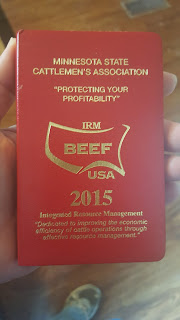As part of the protocol at our house, soon after calves are born, they and their mothers are moved into a pen of other pairs, sort of like a nursery. This allows us to keep an extra close eye on them to ensure they "mother up", are eating well, and stay healthy.
This is our calving book. This is where we keep ALL of our records - cow numbers, calving dates, calving score, the calf's sex and tag number. This is also where we keep treatment records. Bull calf T114 has a mild bacterial respiratory issue. No worries though, it's easily treatable with an appropriate dose of antibiotics. We're fortunate to have a large animal veterinarian close to home who's a great resource for us when we need help with animal health. We have what's called a VCPR (Veterinary Client Patient Relationship) with Dr. Dan. A VCPR is when your veterinarian knows your animals/operation well enough to be able to diagnose and treat any medical conditions your animals develop. I guess you could call him the animal version of our family doctor. His medical practice is also where we get any medications we need to treat our animals.
 |
| Silage harvest 2015 |
The many recent attempts to tarnish the reputation of animal agriculture have opened the flood gates to many emotions in our family. Fear, anger, confusion, frustration - all of these emotions are a common theme for those who make their living in animal agriculture during these attempts. For me, the strongest of these emotions is fear. Fear of the unknown, fear of what felt like a direct attack on how we care for our animals, but mostly fear that what we, and the 3 generations before us. have worked so hard build has became so misunderstood by so many. The #1 reason we started this blog was to help document the trials and tribulations of trying to preserve a family business to pass it off to the next generation. We felt the story of T114 worth documenting as part of our plan going forward.
Education. This is exactly how we plan to ease the feeling of fear we're having such hard time shaking.
This summer I(Ashley) had an amazing opportunity to be part of a team that helped educate 1,500+ producers across the state on BQA (Beef Quality Assurance) best management practices. (One of the reasons for the 6 month "vacation" from our little 'ol blog here...) Not only have these 1,500+ farmers and ranchers invested their time, energy and resources on improving their own farms and ranches, but they have also made a promise to produce a safe, healthy wholesome beef supply that our consumers expect and demand. What a great story to tell about how beef farmers and ranchers not only care about their animals, but also care about doing what they know is right!
Let's use these recent negative events to serve as a reminder to not only take time to educate consumers about what we do and why we do it, but to also educate ourselves about what tools we have to tell our story and preserve our way of life to pass on to the next generation of farmers and ranchers.
Until next time, keep telling your story!
Until next time, keep telling your story!
OH, and ps... T114 is still alive and well thanks in part to the implementation of best management practices on our farm, Dr. Dan, and the appropriate treatment for T114's illness.



No comments:
Post a Comment